
The Amazing Spider-Man (vol. 1) #2
Title: “Duel to the Death with the Vulture”
Medium: comic
Cover date: May 1963
Publisher:
Keywords: greed, pride, attention-seeking, self-aggrandizement, thief, science, family love
3 characters in this story:
| Character (Click links for info about character and his/her religious practice, affiliation, etc.) |
Religious Affiliation |
Team(s) [Notes] |
Pub. | # app. |
||||||
|---|---|---|---|---|---|---|---|---|---|---|
|
|
Secret Defenders; Spider-Man and His Amazing Friends...  |
 |
10,664 | ||||||
|
Sinister Six; Sinister Twelve |  |
342 | |||||||
|
NYPD [escorted Tony Stark to airport; saw many super-hero events] |
 |
11 |
HIGHLIGHTS: The Vulture is introduced. He is a talented engineer capable of creating a flying suit and, but he uses his device simply to become a flamboyant thief. He intentionally draws attention to his crimes, which garner him less money than if had simly sold or commercialized his technological innovations. He is greedy, but also attention-seeking. He is also prideful, actually looking forward to battling "worthy foes" and thinking himself capable of defeating Spider-Man.
Peter Parker is thought of primarily as a science nerd by his classmates and others, and he exhibits considerable scientific and engineering skill. But he is less interested in science than in making money. As Spider-Man, he tackles the Vulture not because he wants to stop a thief from terrorizing the city, but because he wants to make money by selling picture of the high-flying criminal. When Peter does earn a considerable amount of money from this case, he uses it for Aunt May, paying the rent for a full year and buying her new kitchen appliances. Peter seems happier providing for his aunt than buying things for himself.
There is little overtly religious content in this story, but we cover this story here in considerably more detail than we might otherwise do because of its historical significance as the second issue of The Amazing Spider-Man.
BELOW: All 14 pages of Amazing Spider-Man #2 (story 1):
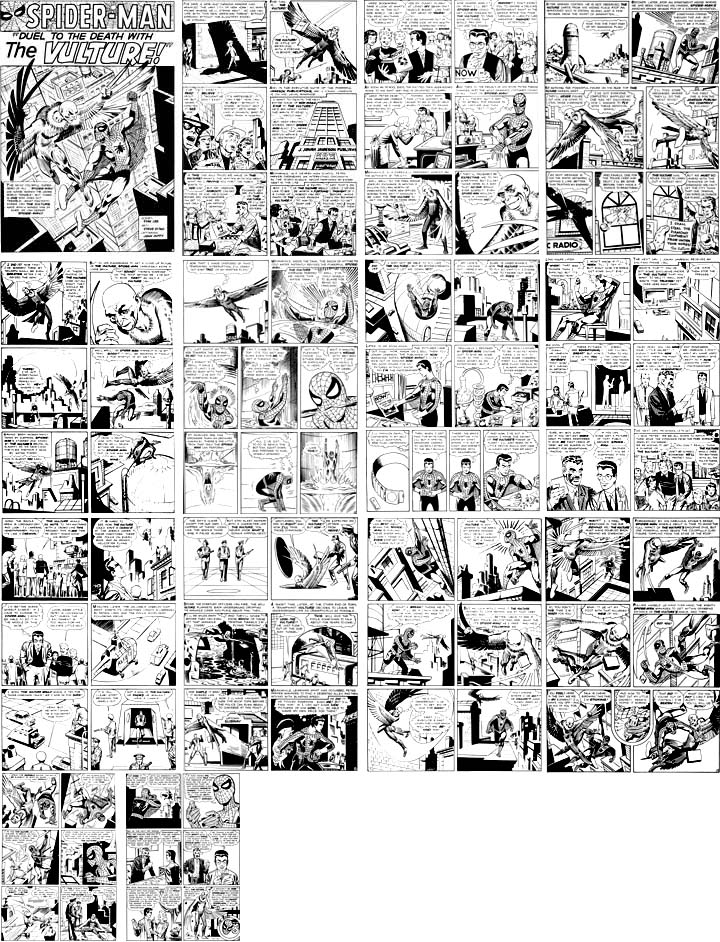
Source: The Amazing Spider-Man (vol. 1) #2 (May 1963). Written by Stan Lee. Art by Steve Ditko.
The splash page on page 1 is not a chronological part of the story proper, but instead presents a single image which captures the essense of the story. This page also presents the a masthead with a nice logo featuring the series title character's name (Spider-Man), the title of the story ("Duel to Death with the Vulture!"), the credits ("Script: Stan Lee; Art: Steve Ditko; Lettering: John Duffy") and a teaser paragraph about the content of the story to come.
This type of first page was the tradition for comics at the time. This splash page, with credits, title, etc. had been used in comics for decades. Much of this is redundant, however. This splash page shows dramatically posed battle Spider-Man and Vulture locked in battle. But this is exactly what is shown on the cover. In-chronology splash/credit pages that would later become the norm in Marvel comics. The first such page (in which the splash/credits page is actually part of the story proper, and not a summary or teaser) would be featured in Amazing Spider-Man #13, in the story that introduced Mysterio.
But here in Amazing Spider-Man #2, the splash page shows us the story's featured villian, the Vulture, facing off against Spider-Man, although this actual scene would not take place until page 12 of the same story. The narrative text on this page provides us with Stan Lee's typically hyperbolic take on the story we are about to read:
Narration: The most coloful super-hero of all . . . Spider-Man! His name makes the underworld tremble! But there is one who does not tremble! What fantastic powr can The Vulture have which makes him so sure he can defeat . . . Spider-Man?
The narrative note about Spider-Man making the underworld "tremble" is interesting. Since when does Spider-Man make the underworld tremble? This is only issue #2 of his series, presenting the fourth-ever published story about the title hero. In Spider-Man's introductory story in Amazing Spider-Man #15 the web-slinger apprehended a common burglar who murdered his uncle. In Amazing Spider-Man #1 our hero saved an astronaut in an out-of-control landing capsule and then apprehended a spy named "The Chameleon" after the spy framed him for the theft of military secrets. That's all.
Spider-Man has, to this point, never been portrayed in any kind of intensive crusade against the "underworld" (a term which can broadly be understood to refer to the criminal class). As far as we have actually seen at this point, if criminals leave Spider-Man and his family alone, they have nothing to worry about.
So it is safe to say that Stan Lee's text on page 1 is hyperbolic. He exaggerates Spider-Man's impact on "the underworld" for dramatic effect.
We can also understand this statement as reflective of what Stan Lee intends the Spider-Man character to become, rather than reporting what the character is already like. Spider-Man has intentionally been crafted by his creators as a decidedly different type of super-hero. His real-world problems, such as his money woes and concerns for his aunt's health, are decidedly non-fantastic. Despite these differences, Lee intends very much for Spider-Man to be a super-hero and fit within the broad classification of classic costumed crime-fighters. So, because Spider-Man is a super-hero, Stan Lee assumes that, by definition, he will cause the underworld to tremble.
And yet, despite his dramatic splash page teaser text, Stan Lee never lets Spider-Man be quite so simple. Spider-Man may have later become more of a general do-gooder, closer in some respects to more traditional super-heroes such as Batman and Superman. But as of Amazing Spider-Man #2 (and for many, many issues afterward), this simply isn't the case. Spider-Man is not yet shown as a general protector of New York City and he is not shown waging war against his city's underworld.
In previous stories we saw Spider-man go after criminals only because (a) a criminal killed his uncle and (b) a criminal framed him for a crime. This Amazing Spider-Man #2 story introduces a new reason why Spider-Man will go after a criminal: He'll do so if he can make a buck in the process.
It may sound crass to put it this way, but this pretty much was how Spider-Man worked for dozens of issues when the character was first introduced: Spider-Man only confronted criminals when they directly threatened him or his family and friends or when he could make money by photographing his battles with them.
This is not to say that Peter Parker didn't have a strong sense of right and wrong. He did. He lived by a strict code of ethics and he thought about what was right and wrong in both is personal and public life. Once Spider-Man was on a case, on the trail of a criminal or trying to stop a crime, he often saw things through, even when he didn't obtain saleable photographs in the process. But Spider-Man simply was not routinely fighting crime out pure altruism. The story in Amazing Spider-Man #2 in which he fights the Vulture is an excellent example of this.
As shown in this story, Peter Parker is aware of the Vulture's crime wave, but he completely ignores the super-criminal until he realizes that he could earn money by selling photographs of him. Even after taking on the Vulture, Spider-Man is clearly portrayed in this story as being principally interested in earning money, not in stopping the Vulture's crimes.
In pointing out all this, it is important to realize that Peter Parker is not portrayed as a "bad" person. He is not portrayed as "greedy." He is simply being characterized in a more human, more realistic manner than super-heroes were previously portrayed. Once Spider-Man does earn money, he gives it to his economically distraut aunt.
Readers can decide for themselves how "heroic" it is to apprehend a criminal for the sake of earning money for one's own family. Should Peter Parker have given the money he earned to charity? Should he have tried to apprehend the Vulture without earning money in the process? Do not police officers and soldiers get paid for their work? Peter Parker didn't seem very interested the Vulture's crime spree before he thought of a way he could make money off it. Should he have been? The Vulture was stealing from wealthy people and businesses (because that's where the money is). Apparently these crimes didn't tug on Peter Parker's heart strings. Most New Yorkers weren't particularly outraged. The Vulture was treated in the press and by Peter Parker's peers as more of a "celebrity" than somebody who engendered hatred our outrage. One might wonder why Peter Parker should have involved himself in this case when New York City's tax-supported police force was already tasked with catching the Vulture.
BELOW: The villainous flying Vulture is introduced: Although he is a talented engineer, he uses his talents to become little more than a common thief:
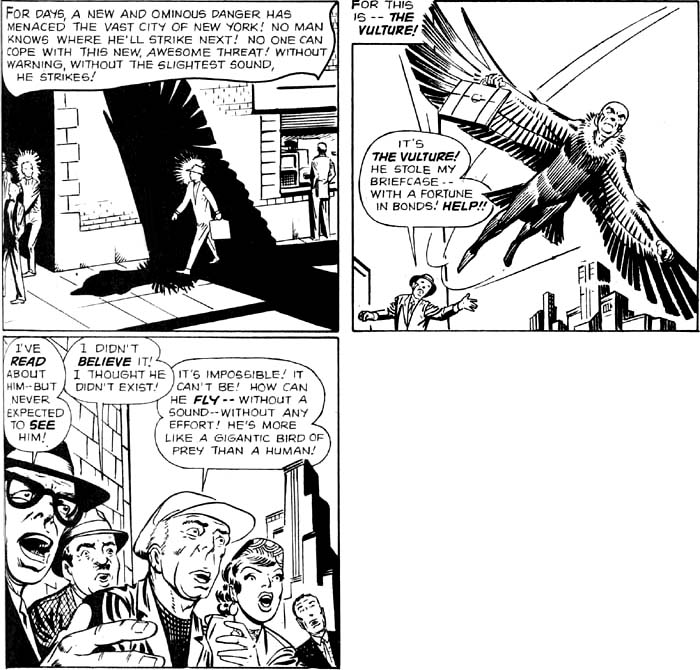
Source: The Amazing Spider-Man (vol. 1) #2 (May 1963), pg. 2, panels 1-3. Written by Stan Lee. Art by Steve Ditko.
On page 2 we see the Vulture for the first time in in-chronology narrative. (The character was shown previously on the cover and splash page.)
Narration: For days, a new and ominous danger has menaced the vast city of New York! No man knows where he'll strike next! No one can cope with this new, awesome threat! Without warning, without the slightest sound, he strikes! For this is -- the Vulture!
[The shadow of the Vulture falls over a man walking on a New York City street. The man wears a business suit and carries a briefcase. The Vulture swoops down and grabs the briefcase away from the startled man.]
Man in business suit: It's The Vulture! He stole my briefcase -- with a fortune in bonds! Help!!
Bystander: I've read about him--but never expected to see him!
Bystander: I didn't believe it! I thought he didn't exist!
Bystander: It's impossible! It can't be! How can he fly -- without a sound -- without effort! He's more like a gigantic bird of prey than a human!
So, as introduced here, the Vulture seems like little more than a common thief in terms of his motivations. He uses extraordinary means, certainly, but he is simply using those means to steal valuables. By the end of the story we see that there isn't much more to it than that. The Vulture doesn't have any particular psychological, ideological or religious motivation. He wants to accumulate wealth, and he is apparently unrestrained by social conscience or religious/ethical values which prevent him from stealing, so he steals.
Another point worth commenting on here is that, when considered in real-world terms, the Vulture doesn't make a lot of sense. He invented his flying suit himself. He is obviously a talented scientist and engineer. If he was really being logical, even if he had no religious or ethical value at all, he would not become a criminal. This is because stealing would be a less effective way to make money than commercializing his technology or patenting his inventions and earning money off of licensing the technology.
But the same can be said for many (perhaps most) costumed super-villains up until this time. So there is little point in dwelling on this quibble here. The Vulture is part of a long tradition of costumed super-criminals who invent technologies which - against all real-world logic - they use to commit crimes rather than to enrich themselves through legal means. If every evil super genius in comic book land actually did the sensible thing by commercializing their technological advances rather than becoming super-villains, comics would be rather boring indeed. So we can overlook this.
This is a longstanding distinct difference between the world of comics and the real world - even in the ostensibly "more realistic" Marvel Universe (as compared to the DC Universe) of the 1960s: In the real world, most criminals are not educated and unusually intelligent. When people are educated, talented and educated, they can earn a living or enrich themselves through legal means. A simple cost-benefit analysis is performed, however unconsciously, that yields an unescapable conclusion: Criminal activity brings the risk of getting caught and subsequently losing wealth, freedom, etc. So even people who have little social conscience, even people who are downright evil, are unlikely to become criminals because the risk is too great that they'll lose what they want in life. The social underclass, on the other hand, is more likely to commit crimes becaues they have less to lose They don't have money, power, esteem, social position. So although the risk of getting caught and fined or jailed is high, the promise of a relatively small financial reward is enough to motivate them to commit crimes.
In the real world, exceptional scientists and engineers are unlikely to become criminals. But in the comic book world, it is entertaining for readers when they do. Who wants to read a 14-page story about "The Vulture" wearing a business suit while filing patent claims and meeting with attorneys to draw up licensing agreements with an emergent personal aviation industry? Besides that, if personal flying harnesses like the Vulture wears were marketed and became commonplace, than Spider-Man's ability to travel via webline would seem rather useless, wouldn't it?
BELOW: Even with the city abuzz about the Vulture, J. Jonah Jameson's thoughts never stray far from his crusade against the 'dangerous menace' known as Spider-Man:
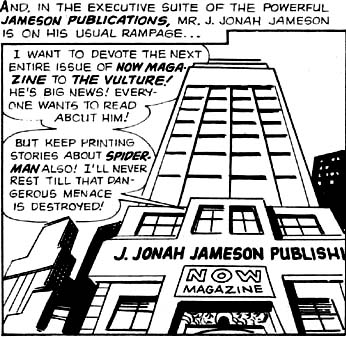
Source: The Amazing Spider-Man (vol. 1) #2 (May 1963), pg. 2, panel 4. Written by Stan Lee. Art by Steve Ditko.
In panel 4 on page 2 we see once again that J. Jonah Jameson hates Spider-Man. This is Jameson's principle charateristic, so much so that it can be identified as his "religion." But note that Spider-Man isn't the only thing that J. Jonah Jameson thinks about. He also thinks (a lot) about making money. The newspaper publisher is particularly excited about the Vulture. But Jameson does not seem angry about the high-flying criminal's crimes. Rather, Jameson looks at the Vulture as a way to make money. Everybody in New York seems eager to read about the Vulture, so Jameson sees he can capitalize on the public's interest by devoting the next issue of his NOW magazine to Vulture coverage.
In panel 6 on page 2 we see that Peter Parker is really only concerned about the Vulture once he realizes he could make money by selling photos of the Vulture to Jameson. It is interesting that J. Jonah Jameson and Peter Parker are both concerned about the Vulture only out of a desire to enrich themselves economically. In this regard, these two adversaries seem rather similar to each other. Spider-Man fans are accustomed to thinking of Spider-Man as their "hero" and J. Jonah Jameson as a "bad guy" (or at least a real jerk). But this story clearly compares Jameson and Parker to each other.
Text from Page 2, Panels 4-6:
Narration: And, in the executive suite of the powerful Jameson Publications, Mr. J. Jonah Jameson is on his usual rampage . . .
J. Jonah Jameson: I want to devote the next entire issue of NOW Magazine to The Vulture! He's big news! Everyone wants to read about him! But keep printing stories about Spider-Man also! I'll never rest till that dangerous menace is destroyed!
[In his office, we see Jameson looking over photos with one of his employees.]
J. Jonah Jameson: Is this the only photo we have of The Vulture? What's the matter with you men? What am I paying you for? The public wants to see him!
Employee: But, Mr. Jameson, nobody can get pictures of him! He's gone before any photographer can get to him! We have only an artist's drawing!
J. Jonah Jameson: No more excuses! Get me pictures of The Vulture -- or I'll get some new editors!
[New scene: Peter Parker holds a test tube in the science lab at his school. His classmates, standing behind him, look at a copy of NOW magazine.]
Narration: Meanwhile, in a nearby high school, Peter Parker overhears an interesting discussion as the young science major performs an experiment in the lab . . .
Flash Thompson: Boy! I'd like to see a close-up photo of The Vulture!!
Liz Allan: A photo of The Vulture would be worth a fortune! Nobody can get close enough to him to snap one!
Peter Parker: [Thinking] Say! That's an idea! I never thought of it before! Magazines pay big money for hard-to-get photos! And I know how to get them!
BELOW: Even in the middle of doing a science experiment, "science major" Peter Parker's attention quickly gravitates to the opportunity to make some "big money":
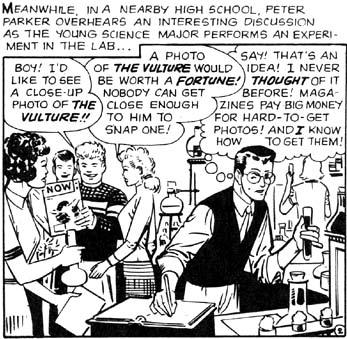
Source: The Amazing Spider-Man (vol. 1) #2 (May 1963), pg. 2, panel 6. Written by Stan Lee. Art by Steve Ditko.
Here we see that even in the middle of doing a science experiment, Peter Parker's attention quickly gravitates to the opportunity to make some "big money." This panel aptly captures the three interests or motivations that are paramount in young Peter Parker's life: science, money and heroism. Peter is indeed studying science and wants to work as a professional scientist someday. He is even called in the narration a "science major," although exactly what this means in a public high school setting is unclear. But when the chance comes to earn some "big money," this takes precedence over Peter Parker's interest in science. Science is always something he can go back to. He needs money now. And, as was often the case at this period in Spider-Man's career, his supposed "heroism" in going after the Vulture was quite secondary to his quest for money.
BELOW: Even in the middle of doing a science experiment, "science major" Peter Parker's attention quickly gravitates to the opportunity to make some "big money":
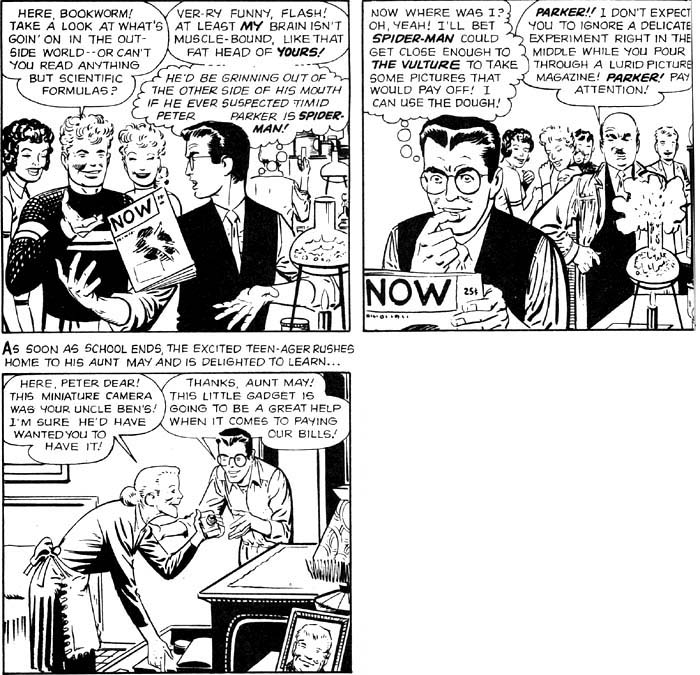
Source: The Amazing Spider-Man (vol. 1) #2 (May 1963), pg. 3, panels 1-3. Written by Stan Lee. Art by Steve Ditko.
Text from Page 3, Panels 1-3:
Flash Thompson: Here, bookworm! [Tosses the copy of NOW Magazine to Peter Parker] Take a look at what's goin' on in the outside world -- or can't you read anythihng but scientific formulas?
Peter Parker: Very-ry funny, Flash! At least my brain isn't muscle-bound, like that fat head of yours! [Thinking] He'd be grinning out of the other side of his mouth if he ever suspected timid Peter Parker is Spider-Man! Now where was I? Oh, yeah! I'll bet Spider-Man could get close enough to The Vulture to take some pictuers that would pay off! I can use the dough!
science teacher: Parker!! I don't expect you to ignore a delicate experiment right in the middle while you pour through a lurid picture magazine! Parker! Pay attention!
[Cut to Peter Parker's home, after school. Aunt May is retrieving a long-unused camera from a drawer.]
Aunt May: Here, peter dear! This miniature camera was your Uncle Ben's! I'm sure he'd have wanted you to have it!
Peter Parker: Thanks, Aunt May! This little gadget is going to be a great help when it comes to paying our bills!
On page 3, panels 1 through 3, we see how thoroughly distracted Peter Parker has become once he thinks about the money he could earn. He so completely neglects his science experiment that his professor scolds him. The professor has become accustomed to seeing a Peter Parker completely engaged in scientific curiosity. But since Peter became Spider-Man, his interest in science has often taken a sudden back seat to other interests. Particulary since Peter's Uncle Ben dies, Peter has been concerned with his family's economic survival.
Peter Parker's classmates and teachers are unaware of all this, however. They still look at Peter primarily as a science nerd. Flash Thompson once again calls Peter a "bookworm" (page 3, panel 1) and clearly believes that Peter has no interest in anything "but scientific formulas." Peter's teacher specifically states that he doesn't "expect" Peter to ignore his scientific experiments. We, the readers, realize that Peter Parker does have interests other than science. But the people around him mentally see Peter only one very narrow category: science geek.
In panel 1 on page 3 we see once again that, from being an "angelic hero," Peter is quite willing to make fun of Flash Thompson. Peter refers to Flash's "muscle-bound" brain and calls his school nemesis a "fat head." Since gaining super powers, is no longer physically intimidated by Flash. It is also apparent that Peter remains somewhat bitter about the mistreatment he receives from other students. Peter still seems to think of himself as rather persecuted by his intellectual inferiors. But from a more objective view, Peter's classmates aren't really that bad. Their bullying is rarely more than verbal. And often they are trying to get Peter to come out of his shell or attend social events with them. Peter Parker really does act like an intellectual snob around them. An objective party might well counsel Peter to ease up on his classmates and laught along with them sometimes. In the years that follow, Flash Thompson's will be portrayed as somebody who really wasn't "evil," but was just a typical high school jock. In fact, Flash will soon become one of Spider-Man's biggest fans and will eventually become one of Peter Parker's closest friends.
The look on Peter Parker's face while he looks at NOW Magazine in panel 2 on page 3 really illustrates how intensely he is thinking about making money.
In panel 3 on page 3, note the framed photo of Uncle Ben, in the foreground of the panel. Although Uncle Ben died in the very first Spider-Man story (Amazing Fantasy #15), his is an intensely-felt presense throughout Spider-Man's career.
In panel 3 on page 3 we see also that Peter is still thinking about "paying our bills." It says something about the character that he is wants to help provide for his aging aunt. He isn't simply trying to earn money so he can buy stuff for himself.
BELOW: The Vulture primarily thinks about enriching himself through theft:
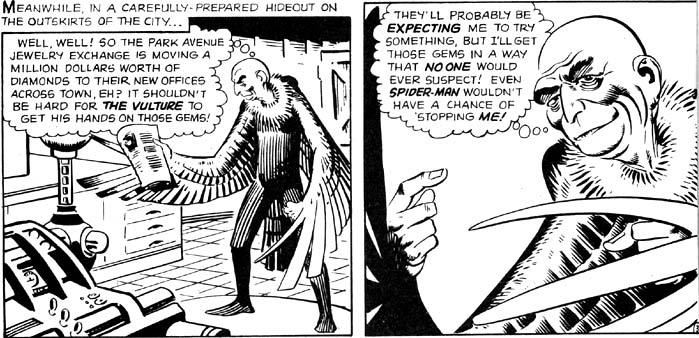
Source: The Amazing Spider-Man (vol. 1) #2 (May 1963), pg. 3, panels 5-6. Written by Stan Lee. Art by Steve Ditko.
Text from Page 3, Panels 5-6:
Narration: Meanwhile, in a carefully-prepared hideout on the outskirts of the city . . .
The Vulture: [Thinking, reading a newspaper] Well, well! So the Park Avenue Jewelry Exchange is moving a million dollars worth of diamonds to their new offices across town, eh? It shouldn't be hard for The Vulture to get his hands on those gems! They'll probably be expecting me to try something, but I'll get those gems in a way that no one would ever suspect! Even Spider-Man wouldn't have a chance of stopping
In panels 5 and 6 on page 3, we see that - like J. Jonah Jameson and Peter Parker - The Vulture is also thinking about making money. There's just not much more to him than that. Later in his career, Spider-Man's foes were more likely to have far more unique motivations. But most of his early foes were simply greedy criminals wanting to steal in order to enrich themselves financially. Of course, once they were thwarted in their initial appearances by Spider-Man, the criminals obtained a secondary motivation: revenge against Spider-Man. This pattern was fairly typical comic book fare, and had been seen for decades.
In this scene, we also see a hint of pride in the Vulture's persona. This character is not purely interested in making money. He has intentionally crafted a costume designed to attract attention and make himself famous (or "infamous"). He also is well aware of Spider-Man's fame and reputation, but he thinks that he himself can best Spider-Man. And why shouldn't he think this? Thus far, Spider-Man has never faced a truly super-powered foe. The Chameleon was skilled in disguising himself as others. But this was a skill he used principally as a spy. The ability was of little real use in pure combat. The Vulture, with has remarkable flying ability, can be viewed as the first "super-powered" villain faced by Spider-Man. (Of course, the Vulture's ability is not innate, but comes form his technological invention.)
BELOW: The Vulture isn't interested purely in materialistic goals. He is also something of a show-off, unnecessarily drawing attention to his crimes:
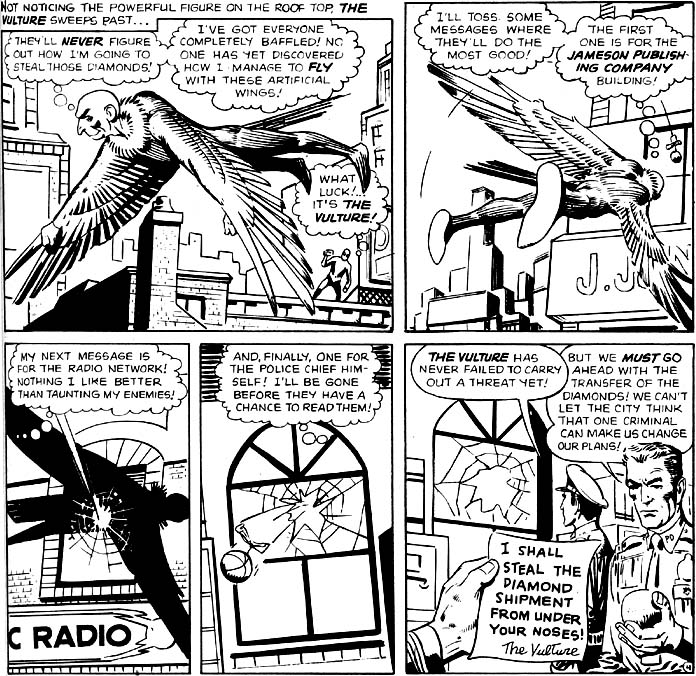
Source: The Amazing Spider-Man (vol. 1) #2 (May 1963), pg. 4, panels 3-7. Written by Stan Lee. Art by Steve Ditko.
Text from Page 4, Panels 3-7:
Narration: Not noticing the powerful figure on the roof top, The Vulture sweeps past . . .
The Vulture: [Thinking while flying.] They'll never figure out how I'm going to steal those diamonds! I've got everyone completely baffled! No one has yet discovered how I manage to fly with these artificial wings!
Spider-Man: [Thinking] What luck! . . . It's The Vulture!
The Vulture: [Thinking while flying and tossing a note tied to a weight into the window of the Jameson Publishing Company building.] I'll toss some messages where they'll do the most good! The first one is for the Jameson Publishing Company building! [Tossing a note through the window of a radio station] My next message is for the radio network! Nothing I like better than taunting my enemies! [Throws a third weighted note, this one through the window of a police station.] And, finally, one for the police chief himself! I'll be gone before they have a chance to read them!
[In the next pane we see the interior of the police station. A policeman looks at the broken window. Another police officer has handed the chief the note. We see the note held in the chief's foreground.]
Police Officer: The Vulture has never failed to carry out a threat yet!
Other Police Officer: But we must go ahead with the transfer of the diamonds! We can't let the city think that one criminal can make us change our plans!
Text of note: I shall steal the diamond shipment from under your noses! [Signed] - The Vulture
Page 4 (panels 3-7) more clearly illustrates that the Vulture has interests and motivations other than pure materialism. He is prideful and he is an attention-seeker. He openly challenges New York City to try to thwart his next crime. He openly announces his intent to steal the diamonds being transported in an upcoming shipment.
Another example of the Vulture's pride and attention-seeking impulse is the fact that he does not wear any mask whatsoever. He is instantly recognizable. Compare this to the Chamelon, the previous issue's villain, who was never seen without a mask. From an extra-textual perspective, one could point that the Vulture's maskless face and bald head make him look more like his animal namesake. But the in-story interpretation leads us to believe that this villain wants people to know who he is. He is so illogically prideful that he thinks even if authorities can see his face, they will still be unable to track him down and catch him. Sure, the Vulture's flying ability makes it difficult for police to catch him in the act of committing his crimes. But isn't it likely that people the Vulture has worked with in professional and academic circles might recognize his face and report his identity to the police? Then authorities could simply check property records to find out where the criminal might be hiding out in his downtime. But all of this is lost on the Vulture, who is caught up in his grandiose pride.
If the Vulture was only interested in enriching himself, he would not have announced his crimes to newspapers, radio and police. If he was only interested in enriching himself he would have disguised himself so that it would be more difficult for authorities to track him down and apprehend him. The Vulture may be a brilliant technologist (his flying harness is evidence of this), but he doesn't seem to be acting logically here. Of course, "logic" is often relative. If one's only purpose is to obtain riches, than telling the police about your upcoming heist seems to make no logical purpose. But if the Vulture was only interested in riches, he simply would have sold his technology. The Vulture clearly does have other interests. He wants to make a name for himself. So, if his goals are to obtain riches and become even more famous (or "infamous"), then announcing his crimes beforehand is a logical thing to do.
The Vulture even thinks to himself: "Nothing I like better than taunting my enemies" (page 4, panel 5). Maybe this is hyperbole. Doesn't the Vulture like money more than he likes taunting his enemies? Probably so. But throughout much of the rest of this story, the Vulture does go out of his way to "taunt" his "enemies" - first the police and then Spider-Man.
Note also how we see a tiny drawing of Spider-Man in the background of panel 3 on page 4. Spider-Man, holding his camera, thinks: "What luck! It's the Vulture!" Peter Parker is intent on using his Spider-Man powers to take pictures of the Vulture - pictures he can sell to J. Jonah Jameson for a tidy profit. Amazingly, Spider-Man isn't even planning to try to apprehend the Vulture. He just wants the profit from the photos.
BELOW: The Vulture and Spider-Man: Not a pure thief, and not a pure hero:
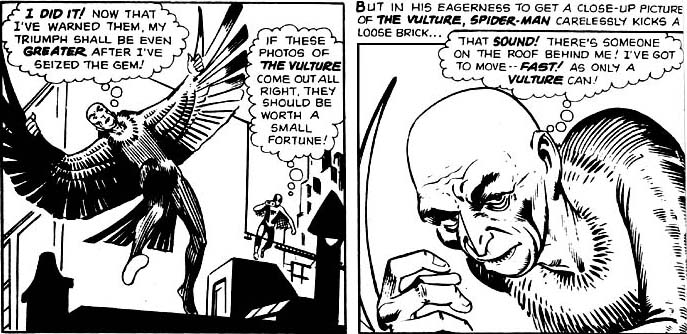
Source: The Amazing Spider-Man (vol. 1) #2 (May 1963), pg. 5, panels 1-2. Written by Stan Lee. Art by Steve Ditko.
Text from Page 5, Panels 1-6:
Vulture: [Thinking while flying away from the police station where threw a message through the window.] I did it! Now that I've warned them, my triumph shall be even greater after I've seized the gem!
[Spider-Man is jumps on rooftops, chasing after the Vulture while holding a camera to his face, trying to get a photo of the colorful criminal.]
Spider-Man: [Thinking] If these photos of The Vulture come out all right, they should be worth a small fortune!
Narration: But in his eagerness to get a close-up picture of The Vulture, Spider-Man carelessly kicks a loose brick . . .
Vulture: [Thinking]That sound! There's someone on the roof behind me! I've got to move -- fast! As only a vulture can!
Spider-Man: [Thinking.] There! I've got everything adjusted perfectly. Now to-- Hey!! Where'd he go?
[The Vulture, who has spotted Spider-Man, rapidly loops in the air so that he comes up from behind Spider-Man, who is standing still on a rooftop. Spider-Man's inexperience with his camera is very evident here. In the next panel the Vulture kicks Spide-Man in the head after a high speed dive. Spider-Man is instantly knocked unconscious.]
Vulture: [Thinking] Well, well! So Spider-Man himself is on my trail! Good! It will be amusing to finally face a foe worthy of my mettle!
Narration: Having been momentarily taken by surprise, Spider-Man is stunned and dazed by The Vulture's brutal onslaught, as his merciless foe flies towards a nearby water tower . . .
Vulture: [Thinking] This is almost too easy!
[The Vulture drops Spider-Man's dazed body through the hatch of a rooftop water tower.]
Vulture: [Thinking] Once I drop him into the water below, he'll never bother me again! With Spider-Man out of the way, the city will be mine!
The Vulture is not a "pure" thief, just as Spider-Man is not a "pure" hero. The Vulture seems as interested in the fame and glory associated with his crime as with the financial gain. Spider-Man is tracking down the Vulture primarily for the money he'll earn by selling photos of the criminal.
There is nothing in this story to indicate that Spider-Man has, at this point, any intention in actually apprehending the Vulture. He is thinking only about the "small fortune" that he hopes his photos will bring him.
BELOW: The Vulture looks forward to battling Spider-Man, "a foe worthy of his mettle":
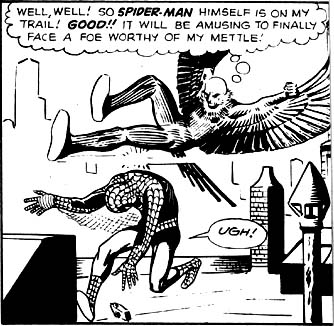
Source: The Amazing Spider-Man (vol. 1) #2 (May 1963), pg. 5, panel 4. Written by Stan Lee. Art by Steve Ditko.
The Vulture's thoughts about "finally" facing a "foe worthy of [his] mettle" (page 5, panel 4) is once again indicative of the fact that he isn't a "pure" thief (if there really is such a thing). The Vulture is actually looking forward to battling the famous Spider-Man.
But, alas, the Vulture doesn't get much of a fight from Spider-Man at this point. After spotting Spider-Man and looping around to kick him in the head, the Vulture succeeds in knocking Spider-Man out with one blow!
When the Vulture drops Spider-Man into a water tower, he is clearly intending to murder the hero. But it is interesting to note that the Vulture seems to be insufficiently cold-blooded to physically finish Spider-Man off himself. Instead, he'll let the wall-crawler drown. This might not be a particularly good plan, if one thinks about it. One might suspect that the water could revive Spider-Man, which is exactly what it does (page 6, panel 2).
From a more pragmatic, extra-textual perspective, we might observe that super-villains often do things like this. It gives the hero a chance to be placed into a "death trap," from which they must use their wits and/or powers to extricate themselves. Which, of course, is exactly what Spider-Man does in this case.
BELOW: Peter Parker uses science to advance his career as Spider-Man, but he has used that identity primarily to make money. ALSO: J. Jonah Jameson "hates Spider-Man":
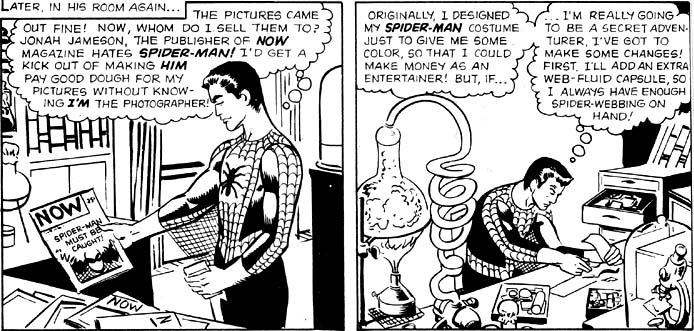
Source: The Amazing Spider-Man (vol. 1) #2 (May 1963), pg. 7, panels 3-4. Written by Stan Lee. Art by Steve Ditko.
Text from Page 7, Panels 1-2:
Narration: Later, in his room again . . .
[Peter Parker, still wearing his Spider-Man costume, but without the mask, looks at a NOW Magazine which has his own picture on the cover, along with the Jameson-dicated copy: "Spider-Man must be caught!"]
Peter Parker (Spider-Man): [Thinking] The pictures came out fine! Now, whom do I sell them to? Jonah Jameson, the publisher of NOW Magazine hates Spider-Man! I'd get a kick out of making him pay good dough for my pictures without knowing I'm the photographer! Originally, I designed my Spider-Man costume just to give me some color, so that I could make money as an entertainer! But, if . . . I'm really gong to be a secret adventurer, I've got to make some changes! First, I'll add an extra web-fluid capsule, so I always have enough spider-webbing on hand!
Page 7 features a scene that was typical for his period of Spider-Man's stories, and, in fact, typical throughout much of his career. Spider-Man is shown as a scientist, but he uses science to further his goals as a super-hero or a money-seeking photographer, not purely out of a love of science. Peter Parker is a very pragmatic, applied scientist. His scientific capabilities and interests are always a part of his personality, but not the defining part.
Note how Peter Parker specifically describes J. Jonah Jameson by saying that the publisher "hates Spider-Man." We will see these words again and again through Spider-Man's stories. The narration, Spider-Man, and Jameson all state that Jameson "hates Spider-Man." J. Jonah Jameson doesn't simply "dislike Spider-Man." He doesn't "disagree with Spider-Man's tacticts" or "hate all costumed crime fighters." Jameson specifically "hates Spider-Man," and this fact is so key to his personality and portrayal that it is indeed accurate to summarize Jameson's "religion" as "hates Spider-Man."
Note also how Peter Parker specifically states (page 7, panel 4) that he originally designed his Spider-Man costume just to give him "some color" so he could better "make money as an entertainer." But now he is starting to think about continuing his exploits as a "secret adventurer." Spider-Man contrasts with many other super-heroes in the way that he really didn't embark on the path of a traditional "super-hero" immediately after his origin story. He was sort of on this path, but not quite. Spider-Man's emergence as a genuine selfless hero was far more gradual than how super-heroes were originally introduced up until this time.
BELOW: "J. Jonah Jameson wants photos of Spider-Man, who he considers a "public menace":
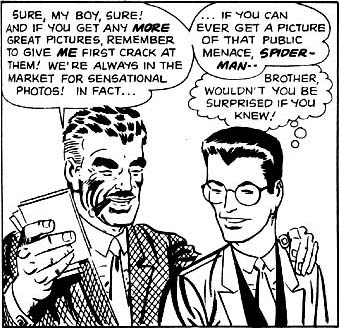
Source: The Amazing Spider-Man (vol. 1) #2 (May 1963), pg. 8, panel 5. Written by Stan Lee. Art by Steve Ditko.
Text from Page 7, Panels 1-2:
J. Jonah Jameson: Sure, my boy, sure! And if you get any more great pictures, remember to give me first crack at them! We're always in the market for sensational photos! In fact . . . if you can ever get a picture of that public menace, Spider-Man--
Peter Parker: [Thinking] Brother, wouldn't you be surprised if you knew!
On page 8 Peter Parker sells photos to J. Jonah Jameson for the first time. These are the photos of the Vulture. Fortunately, he was able to snap some before the Vulture knocked him out, and the Vulture apparently never realized that Spider-Man was taking pictures of him, or didn't care because he thought he had disposed of the hero permanently.
J. Jonah Jameson is quite pleased to buy photos of the Vulture, and he immediately agres to buy them. Jameson also asks how Peter was able to take the photos, but Peter says he'll sell Jameson the photos only on the condition that Jameson never ask that question.
A legitimate question may be asked whether it is "ethical" for Peter Parker to sell photographs of himself as Spider-Man, without disclosing that he himself is the subject of the photographs. Does this constitute proper ethical standards for a journalist or a photographer? Peter Parker doesn't seem to think there's anything wrong with it, but he seems to know that J. Jonah Jameson wouldn't be happy about it. Peter Parker, who is none to pleased about Jameson's crusade against his costumed identity, actually seems to relish "sticking it to" Jameson in this way. See page 7, panel 3, where Peter thinks to himself: "I'd get a kick out of making him pay good dough for my pictures without knowing I'm the photographer!
BELOW: Flash Thompson still calls Peter Parker a "bookworm", but he and the other kids at school seem to be warming up to Peter a bit:
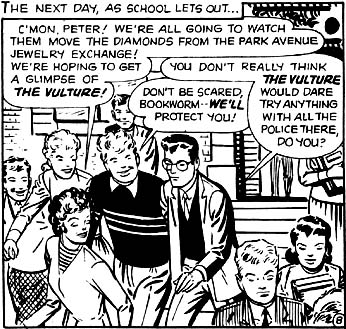
Source: The Amazing Spider-Man (vol. 1) #2 (May 1963), pg. 8, panel 6. Written by Stan Lee. Art by Steve Ditko.
Text from Page 8, Panel 6:
Dark-haired female classmate: C'mon, Peter! We're all going to watch them move the diamonds from the Park Avenue jewelry exchange! We're hoping to get a glimpse of The Vulture!
Peter Parker: You don't really think The Vulture would dare try anything with all the police there, do you?
Flash Thompson: Don't be scared, bookworm -- we'll protect you!
In panel 6 on page 8 the kids from school invite Peter Parker to go watch the diamond transfer. Everybody is hoping to catch a glimpse of the Vulture when he shows up to steal the diamonds. As noted before, these teens hardly seem outraged at the Vulture's thefts. They think this is a lark or a game, and they seem to view the Vulture as something of a celebrity. After all, the Vulture is colorful, interesting, and famous. Plus, he flies!
Note how Flash Thompson once again calls Peter Parker a "bookworm." But he also says he'll "protect" Peter Parker. Flash here continues to tease Peter, but it seems like rather good-natured teasing. The kids at school genuinely seem to be warming up to Peter. In fact, Peter's stand-offishness often seems more objectionable than the way the other kids treat him. We realize that Peter is sometimes aloof and sometimes refuses to go places with the other kids because of his secret career as Spider-Man. But how are they supposed to know that?
BELOW: Spider-Man is interested in capturing the Vulture primarily for the money he'll get selling photos:
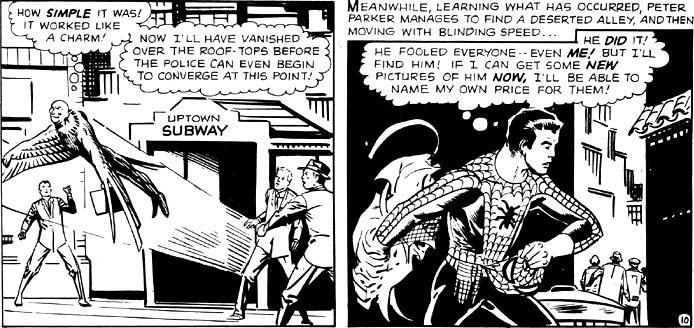
Source: The Amazing Spider-Man (vol. 1) #2 (May 1963), pg. 10, panels 5-6. Written by Stan Lee. Art by Steve Ditko.
Text from Page 10, Panel 6:
Peter Parker (Spider-Man): [Thinking] He did it! He fooled everyone -- even me! But I'll find him! If I can get some new pictuers of him now, I'll be able to name my own price for them!
On page 10 the Vulture cleverly steals the diamonds, despite heavy police protection, by emerging from below, through a manhole cover, instead of from the sky as everybody expected. Then the Vulture darts back into the spacious underground sewer system, which he uses to escape.
Peter Parker changes into Spider-Man, intent on going after the Vulture. But note (page 10, panel 6) how Spider-Man isn't angry about the Vulture's theft or law-breaking. Peter Parker simply wants to take some more pictures to sell. Peter actually seems happy about the Vulture's latest crime, because the notoriety it will bring the criminal will make photos of him even more valuable. Peter thinks about how he'll be able to "name [his] own price for them!"
BELOW: "The thing I like best about being Spider-Man...":
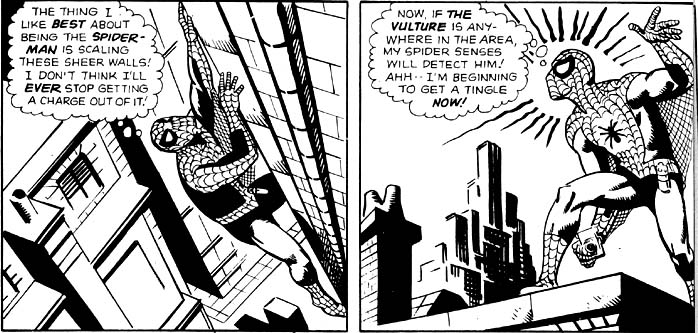
Source: The Amazing Spider-Man (vol. 1) #2 (May 1963), pg. 11, panels 1-2. Written by Stan Lee. Art by Steve Ditko.
Text from Page 11, Panels 1-2:
Spider-Man: [Thinking] The thing I like best about being Spider-Man is scaling these sheer walls! I don't think I'll ever stop getting a charge out of it! Now if The Vulture is anywhere in the area, my spider senses will detect him! Ahh-- I'm beginning to get a tingle now!
Note how Spider-Man thinks to himself that the thing he likes best is scaling walls (page 11, panel 1). Really? Scaling walls is better than swinging on webs? It's better than having the proportionate strength of a spider? It's better than having "spider senses"? It's better than the fame and the money that being Spider-Man brings? Perhaps not. It seems likely that Steve Ditko draw a great pictue of Spider-Man scaling a wall and this line was simply how Stan Lee chose to add some dialogue to the panel. We might say that at that very moment Spider-Man was enjoying his wall-crawling ability, but it could hardly be classified as the thing he likes best in the grander scheme of things.
Spider-Man's spider sense has often been described as one of his most useful powers. But as panel 2 on page 11 shows, this power was originally somewhat nebulous in its capabilities. Eventually his spider sense would be portrayed essentially as a limited precognitive ability that warns him of danger, in much the same way that a spider seems to know a person is about to strike it and can thus get out of the way. But in these early stories, Spider-Man's spider senses did many more things. Many times in early stories Spider-Man was able to use his powers to track or detect an enemy even if he himself was in no danger whatsoever. This is what he does here, using his power to hone in on an unseen fleeing Vulture. Spider-Man was able to do the same thing in the previous issue when he used his "spider senses" to find the Chameleon, who was fleeing the scene of a crime and was already far off in a helicopter.
Panel 2 on page 12 shows Spider-Man using his spider sense in the danger-warning way that was to become standard. Note how this power is often referred to in the narration in these early issues as Spider-Man's "spider's sense." (The possessive form was eventually dropped in favor of the simpler and easier-to-pronounce "spider sense.")
Text from Page 12, Panels 1-2:
Spider-Man: [Thinking] Wait!! I-- I feel vibrations in the air behind me! The Vulture must have doubled back behind me somehow!
Narration: Forewarned by his fabulous spider's sense, Spider-Man wheels about in time to avoid the full impact of The Vulture's swooping dive, but one powerful wing sends the colorfully clad figure toppling from the edge of the roof!
On pages 11 through 13, Spider-Man finds and then battles the Vulture. The high-flying criminal arrogantly thinks that he will easily defeat Spider-Man again. But the Vulture is actually defeated rather quickly by Spider-Man, who has come prepared for the battle.
Immediately after Spider-Man sees that a police helicopter is on its way to pick up the defeated Vulture, his thoughts turn once again to photographing the villain so he can earn money.
BELOW: Spider-Man thinks about the money he'll make selling pictures of the Vulture:
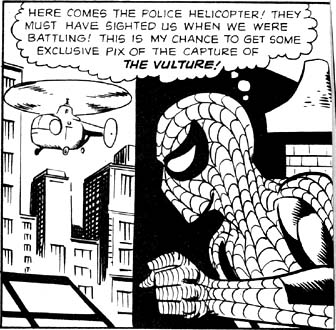
Source: The Amazing Spider-Man (vol. 1) #2 (May 1963), pg. 13, panel 4. Written by Stan Lee. Art by Steve Ditko.
Text from Page 13, Panels 4 and 6:
Spider-Man: [Thinking] Here comes the police helicopter! They must have sighted us when were were battling! This is my chance to get some exclusive pix of the captue of The Vulture! . . . These pictures should be prize-winners!
BELOW: Spider-Man is a talented scientist, but he is more interested in money than science at this time in his life:
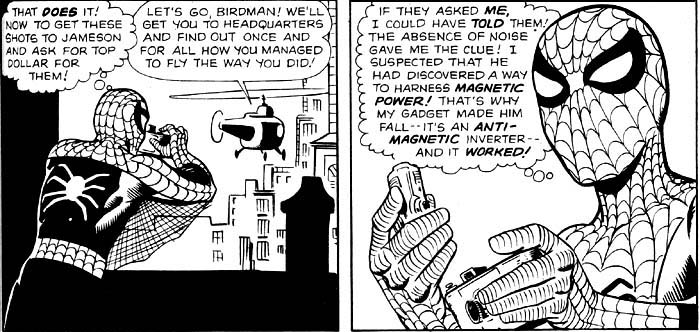
Source: The Amazing Spider-Man (vol. 1) #2 (May 1963), pg. 14, panels 1-2. Written by Stan Lee. Art by Steve Ditko.
Text from Page 14, Panels 1-2:
Spider-Man: [Thinking] That does it! Now to get these shots to Jameson and ask for top dollar for them!
Police helicopter pilot: Let's go, Birdman! We'll get you to headquarters and find out once and for all how you managed to fly the way you did!
Spider-Man: [Thinking] If they asked me, I could have told them! The absense of noise gave me the clue! I suspected that he had discovered a way to harness magnetic power! That's why my gadget made him fall -- It's an anti-magnetic inverter -- And it worked!
On page 14 (panel 2) we get the "scientific explanation" for the Vulture's flying ability as well as for how Spider-Man defeated him: magnets. This is typical of comic book stories from this period, in which a genuine science principle was used as the lynchpin for a story (although the story was distorted beyond all measure). Stan Lee often followed this tradition, although he was always more interested in characterization and human experiences than in science tricks.
The "true scientific" principle in this story is that magnets can silently "levitate" repel magnetic poles. Spider-Man's knowledgeable mind knew this, and led the hero to correctly theorize that the Vulture was using magnetic repulsion in his flying suit. So Spider-Man handily built an "anti-magnetic inverter", which he used to disable the Vulture's flying ability once he got close enough to him. Unfortunately for Spider-Man, this trick only worked once. A few issues later (Amazing Spider-Man #7) Spider-Man encounters the Vulture again, and tries to use his anti-magnetic inverter again. But by then, the Vulture had modified his technology so that it would be immune to any anti-magnetic inversion.
Left unexplained is how (in panel 1 of page 14) Spider-Man was able to hear what the police helicopter pilot was saying over the roar of a flying helicopter's rotor blades hundreds of feet away. It looks like Spider-Man must have read the pilot's word balloon, which is why he answered the pilot's question in his private thoughts in panel 2.
This is a good example of how Peter Parker, the scientist, pragmatically uses his scientific skills to enhance his abilities as a costumed crime fighter.
Text from Page 14, Panels 3-5:
[Peter Parker is presenting photographs to a smiling J. Jonah Jameson in the publisher's office.]
Narration: Then, as the next day dawns . . .
J. Jonah Jameson: Tell me, Parker, are you a magician? How does a teenager like you manage to get pictues that our best staff photogs would give their eye teeth for?
Peter Parker: Remember our deal, Mr. Jameson? That's my secret! Now if you don't want the pix--
J. Jonah Jameson: Are you out of your mind?! With pictures like these, I can almost stand living in the city with Spider-Man! Take a bonus and get out and buy yourself some twist records!
Peter Parker: [Thinking, while counting the cash in his hand.] He thinks I'm just a typical teen-age kid! Good! That's the way I like it! And this was of bills he paid me is what I like also!
Narration: And, upon reaching his home . . .
Peter Parker: Aunt May, this money means you're not gonna have to worry about anything again! I paid the rent for a full year, and tomorrow I'm buying you the newest kitchen appliances you ever drooled over!
Aunt May: Oh, Peter, I'm so proud of you! It's just like your Uncle Ben always said -- You're the most wonderful boy in the world!
BELOW: Peter Parker's interest in money isn't based on selfish greed. When he comes into a large sum of money, he uses it to provide for his beloved Aunt May:
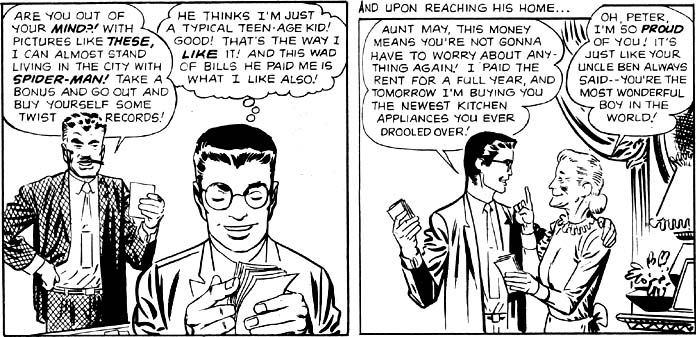
Source: The Amazing Spider-Man (vol. 1) #2 (May 1963), pg. 14, panel 3 and 5. Written by Stan Lee. Art by Steve Ditko.
Panels 4 and 5 on page 14 illustrate a way in which Peter Parker is different from other teenagers. Having earned a substantial money selling photographs to J. Jonah Jameson, Peter uses all of the money to provide for his aunt.
Of course, he is also providing for himself at the same time, by paying the rent for the place they both live in. But most teenagers we know would not be so selfless. They expect their parents or custodians to pay for the rent or mortgage or otherwise provide for basic material means, and they use whatever money they earn for themselves. (Jameson thinks that Peter will use the money to buy rock music records.)
So there is some element of self-preservation in Peter's actions when he pays the rent for a year. But his purchase of new kitchen appliances for his Aunt seems entirely selfless and generous. Peter has no interest in cooking appliances. The kitchen is entirely his aunt's domain and buying new appliances is purely something he does to please her.
In donning his Spider-Man costume primarily to earn money, Spider-Man is not necessarily a "bad person." He is certainly portrayed positively in this and other stories in his series. He is the kind of young man anybody would love to have as a son or nephew or friend.
But Spider-Man is also less altruistic than other super-heroes of this time. Many other super-heroes (such as Batman) actively sought out opportunities to fight crime and refused financial compensation for doing so. But is it fair to compare Spider-Man to Batman in this regard? Bruce Wayne (Batman) was born into a fabulously wealthy family and never knew true poverty like Peter Parker experienced every day. Of course he doesn't care about getting paid for his good deeds!
Perhaps a better comparison would be Superman. Clark Kent is a news reporter who seemingly lives in a modest apartment and earns a professional salary but is by no means rich. Couldn't he use exra money? Yet Superman has many times been shown steadfastly refusing financial compensation for his good deeds. And yet, is Superman really any different than Spider-Man in this area? How has Clark Kent made a name for himself as a journalist? By selling news stories about Superman. Yet, he secretly is Superman. Clark Kent has access to the subject he writes about that no other reporter could possibly have. Superman's situation seems less crass because we never see him actually "selling" his stories to his publisher in return for wads of cash. But the only real difference is that Clark Kent is on his newspaper's salaried staff while Peter Parker is a freelancer. We don't see money change hands, but Clark Kent sells stories about himself just much as Peter Parker does.
Having said all that, Superman was indeed a more altruistic super-hero than Spider-Man in the wall-crawler's introductory stories for this reason: Superman actively sought to help all people, even when he didn't sell stories about doing so. Early on, Spider-Man only went into action to protect himself or his loved ones, or to make money.
So while Peter Parker is admirable for helping out his aunt, this is less "heroic" than helping out strangers. In our analysis of the first story in Amazing Spider-Man #1 we pointed out how J. Jonah Jameson's love of his son John was admirable, but hardly surprising or heroic. We noted Matthew 5:46: "For if ye love them which love you, what reward have ye? do not even the publicans the same?"
Peter Parker does show great love to his Aunt. But even publicans (and even super-villains) do the same, so one must temper one's applause for this.
As Spider-Man's character developed over the years, Spider-Man became a far more altruistic character. In fact, Spider-Man would be one of the most "Christian" super-heroes around in the sense that he eventually actively practiced (at least sometimes) the commandment in Matthew 5:44 to "love your enemies." But in this early stories, this is hardly the case.
As of Amazing Spider-Man #2, Peter Parker does not love his enemies and he doesn't even seem to care much one way or another about the general public either. Other than his Aunt May and his dealy departed Uncle Ben, Peter Parker doesn't seem to love anybody.
But Spider-Man clearly is the hero of this story. He's simply a flawed and very human hero, a young man who is still developing on the path to become a far greater hero in years to come.
As for the villain of this story... The Vulture here exhibits greed, sinful pride, and self-aggrandizement. None of these seem like particularly admirable traits. These aren't even very useful or effective self-serving traits. One might wonder about the Vulture's level of maturity. Spider-Man clearly is immature. He is intentionally portrayed as young, brash, hot-headed, impulsive, error-prone, and immature. But Peter Parker is a teenaged high school student! He should be immature. Most high school students are. But the Vulture is clearly an elderly man as well as a trained engineer. What is his excuse?
None of the traits exhibited by the Vulture seem to be indicators of any specific religion, ideology or philosophical system (whether theistic or non-theistic). If we were to classify the Vulture's "religious affiliation" based on this introductory story, the best we could do would be to classify him as manifestly "non-religious."